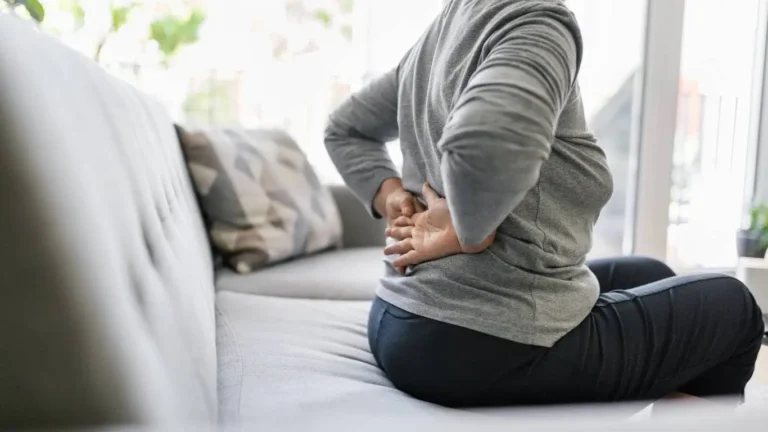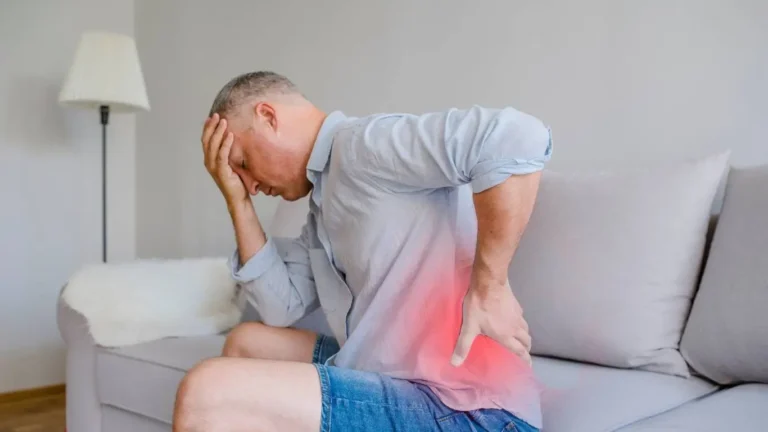Can Bad Posture Trigger GERD? 🚶♀️ How Your Slouching Could Be Making It Worse
Hey there! 👋
If you’ve ever had that annoying, burning sensation in your chest after eating, you know it’s no fun. For many people, GERD (gastroesophageal reflux disease) is a constant battle. And while you might think it’s all about food—like spicy dishes or too much coffee—you might be surprised to learn that your posture could be playing a bigger role in your GERD symptoms than you think.
Let me break it down for you: Can bad posture really trigger GERD? Spoiler alert: it absolutely can. And in this post, I’m going to explain how, and more importantly, how you can fix it.
What’s the Deal with GERD? 🤔

So first things first, let’s make sure we’re on the same page about GERD. Basically, it’s a condition where stomach acid or bile sneaks up into your esophagus, and it’s not just an occasional heartburn after a burrito—it’s chronic. You can experience chest pain, difficulty swallowing, regurgitation, and even a dry cough.
It’s not just about what you eat; things like stress, lack of sleep, and yep, poor posture can make things worse.
How Bad Posture Makes GERD Worse 🦸♂️

Alright, let’s talk about posture. If you’re sitting all slouched over or hunched at your desk all day, you’re putting some serious pressure on your stomach. And this pressure can push that nasty stomach acid right back up into your esophagus—hello, heartburn.
Here’s what’s going down when your posture isn’t on point:
- Abdominal pressure: When you slouch, you’re squishing your abdomen, which increases the pressure on your stomach. This can cause acid reflux, making your GERD worse.
- Weakening your LES: The Lower Esophageal Sphincter (yep, big name) is like the bouncer between your stomach and esophagus. If you’re slouching, that bouncer isn’t doing its job, and acid can leak out.
- Digestive problems: Poor posture messes with how your digestive system works. It can slow things down, leading to bloating and more discomfort.
Troubleshooting GERD and Posture Problems 🚑

Now, if you’re sitting there thinking, “Okay, but how do I know if my posture is the problem?”—let’s troubleshoot a bit. Here are a few things that might sound familiar:
Issue 1: You’re Eating Healthy, But Still Getting Heartburn
You’ve switched to a GERD-friendly diet—no spicy foods, no caffeine—but you’re still feeling that burning sensation in your chest. It’s frustrating, right? If you’re not paying attention to your posture, you might still be triggering reflux.
Fix: Try sitting up straight during meals and for about 30 minutes after eating. Avoid slouching on the couch—your stomach will thank you.
Issue 2: GERD Symptoms Get Worse After Sitting at Your Desk
For me, working at a desk all day used to be brutal for my GERD. I’d sit all hunched over, and by the end of the day, my chest felt like it was on fire.
Fix: Make sure your chair supports your back properly and take breaks every 30 minutes. Don’t just stay in one position for hours.
Issue 3: GERD Keeps You Up at Night
Nighttime GERD is a whole other monster. You lie down, and before you know it, that acid is creeping up into your throat.
Fix: Try propping yourself up with pillows, or use a wedge pillow to keep your head elevated. Sleeping on your left side can also help reduce reflux.
Real Life: Posture Fixes That Actually Work 🌟

Okay, I’m not just going to throw a bunch of tips at you and call it a day. I’ve got a couple of real-life stories to show you how changing posture can really make a difference.
Sarah’s Story: How Posture Helped Her GERD
Sarah had been struggling with GERD for ages. She tried everything—cutting out trigger foods, taking meds, you name it—but the heartburn wouldn’t stop. Then, one day, she realized she was always hunched over at her desk. She decided to change that by sitting up straight and using an ergonomic chair. Within weeks, her heartburn was way less frequent. Simple, right?
John’s Story: A Posture Overhaul for Less Acid Reflux
John loved lounging on the couch, but his GERD hated it. Every time he’d kick back, that acid would rise up and ruin his day. He switched things up by sitting upright and taking breaks from sitting. Guess what? His acid reflux episodes dropped drastically. Small changes, big results.
Key Takeaways 📚
- Posture and GERD: Slouching or poor posture can put pressure on your stomach and trigger acid reflux.
- Fixing Your Posture: Start by sitting up straight, using good back support, and avoiding post-meal lounging.
- Relief Is Possible: A few simple posture adjustments—like propping yourself up at night—can make a huge difference in managing GERD.
- It’s All About Balance: It’s not just posture—combining good habits like eating slowly and managing stress can really help.
FAQs: You’ve Got Questions, I’ve Got Answers! ❓
1. Can bad posture alone cause GERD?
Not entirely, but it can definitely make symptoms worse. If you already have GERD, bad posture can increase the pressure on your stomach, which leads to acid reflux.
2. What’s the best way to sit to prevent GERD?
Sit with your back straight, shoulders relaxed, and feet flat on the floor. You don’t need to be stiff, just avoid slouching or leaning forward.
3. Are there specific exercises to improve posture?
Yes! Core exercises, yoga, and Pilates are great for strengthening your back and abs. But even just being mindful of your posture throughout the day helps a lot.
4. Does sleep posture matter for GERD?
Absolutely! Sleeping on your left side and elevating your head can help reduce reflux while you sleep.
References 📚
- Mayo Clinic: https://www.mayoclinic.org/diseases-conditions/gerd
- American College of Gastroenterology: https://gi.org/topics/acid-reflux
Disclaimer

Camellia Wulansari is a dedicated Medical Assistant at a local clinic and a passionate health writer at Healthusias.com. With years of hands-on experience in patient care and a deep interest in preventive medicine, she bridges the gap between clinical knowledge and accessible health information. Camellia specializes in writing about digestive health, chronic conditions like GERD and hypertension, respiratory issues, and autoimmune diseases, aiming to empower readers with practical, easy-to-understand insights. When she’s not assisting patients or writing, you’ll find her enjoying quiet mornings with coffee and a medical journal in hand—or jamming to her favorite metal band, Lamb of God.







